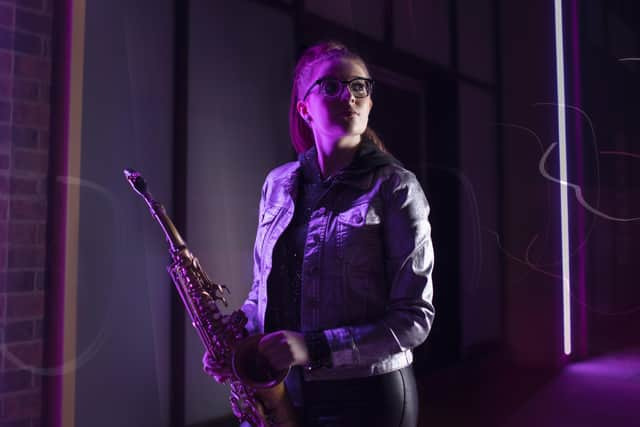Jess Gillam: ‘I wanted to have something that I really felt represented this moment in time as a musician’


A year on from fulfilling a personal ambition by releasing her debut record, the 22-year-old says she wanted to develop “a sense of personal identity and to have something that I really felt represented this moment in time as a musician”.
Time delivers on the early promise that Gillam showed in reaching the final of the BBC Young Musician of the Year competition in 2016. Her repertoire is here extended to include pieces by Philip Glass, Michael Nyman, Bjork and Thom Yorke as well as commissioned works by Luke Howard and Will Gregory of Goldfrapp.
Advertisement
Hide AdAdvertisement
Hide AdOpening track Early Morning Melody was written by the experimental American composer Meredith Monk. “I was completely bowled over and inspired by the way that she uses her voice as an instrument,” Gillam says.
As for the commissions, she says: “One of the most exciting things about the saxophone is that the repertoire is still being created because it’s a young instrument. Commissioning and creating music is something that I’m really passionate about. I’ve been a huge fan of Goldfrapp since I was quite young, and I knew Will is a saxophone player so I thought he would write a great piece, which he has. I’d heard some of Luke Howard’s film music which was completely beautiful and I thought it would be really interesting to hear how he wrote for saxophone.”
As an instrument the saxophone has “a funny identity”, Gillam recognises. “It was designed as a military instrument, but then its roots and its history are in jazz. Of course there are some classical pieces for it included in some orchestral contexts, but it’s an incredible instrument that’s so adaptable, it’s so versatile that you don’t really have to change anything about the instrument to be able to play Motown one second and then classical the next.”
Growing up in Ulverston, Cumbria, Gillam says she feels “lucky” to have had strong support from her parents to purse a career in music. “I had many people saying to me when I was younger, ‘When are you going to get a proper job? You need to study maths so you can be an accountant’, all of this. My mum and dad would always say, ‘No, you do what you love’ and I feel very fortunate to have had understanding and supportive parents.”
Advertisement
Hide AdAdvertisement
Hide AdA graduate of the Royal Northern College of Music, who also studied under the saxophonist and composer John Harle – who encouraged her to be “a flexible artist...and try to take inspiration from different worlds” – Gillam is a staunch advocate for music education. With the Covid crisis putting even more pressure on schools, she says: “I think we’re going to be fighting more than ever to have arts provision and music education because it’s just going to be pushed further and further down the list. I think as musicians and performers it’s our duty to try to expose young children to the magic of music because the curriculum doesn’t think it has room for that right now. Even though I think arts are essential to learning that isn’t a wide view of the Government, so I think it’s the role of the musician to fight for that.


“Over the lockdown I’ve realised how important it is to look at what can be done, rather than what isn’t being done.”
She recommends the Young Musician of the Year competition. “Depending on the young person, I would definitely recommend it,” she says. “I think competitions work well for some people and definitely not so well for others. For me it was an environment that I really thrived in because I work well to deadlines and to having a clear goal, but again, music is not competitive, it’s so subjective and so personal that it’s not like crossing the finish line first. But I would definitely recommend BBC Young Musician for the platform that it gives and also that it’s such a nurturing competition there, they just want you to improve and find yourself as a musician and to help give you the skills to do well.”
Gillam is currently working with the Harrison Parrott Foundation to improve access to music. She explains: “The idea of it is to try to include as many people in the music industry as possible, whether that be trying to diversify our audiences more or also the people who actually work in the arts, in the management, in the concert venues, in the promotional side, trying to make that as diverse as possible so that people can see a career in music as much as possible, whether that’s on the stage or backstage, no matter where they come from or their background, which is I think something that isn’t talked about so much, the whole eco system, the profession, trying to make that as inclusive as possible and to make that a valid career option for as many epople as possible.”
Time is out now on Decca Records.
Comment Guidelines
National World encourages reader discussion on our stories. User feedback, insights and back-and-forth exchanges add a rich layer of context to reporting. Please review our Community Guidelines before commenting.